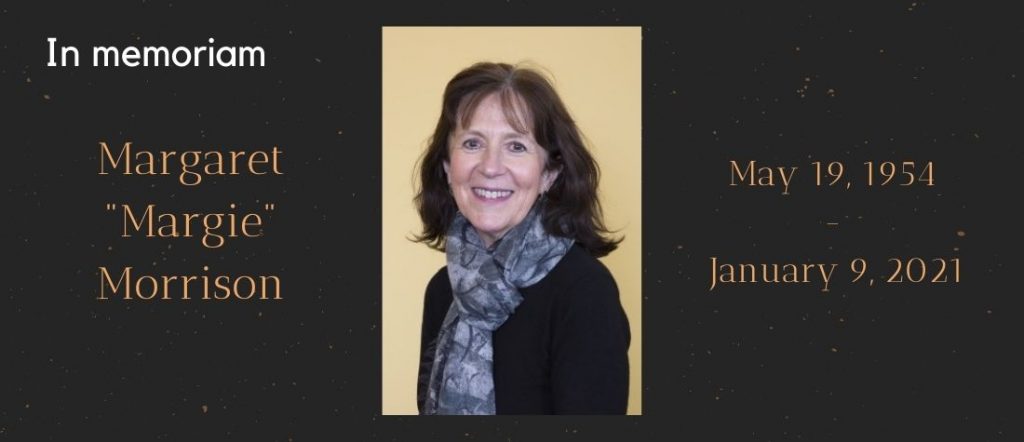
On January 9, 2021, the world of philosophy, especially philosophy of science, lost one of its brightest lights with the passing of Professor Emerita Margaret (“Margie”) C. Morrison. Dr. Morrison, who had joined the Department of Philosophy at the University of Toronto (U of T) in 1989, succumbed to cancer after a protracted battle with the illness. The revered scholar leaves in her wake not only influential insights into the nature of scientific modelling in knowledge production, mathematical explanations in physics and biology, and the epistemic power of computer simulations but also a generous network of successful former students and mentees.
Margaret Morrison first dabbled in philosophy of science as an undergraduate research assistant in the Department of Biophysics at Dalhousie University. She then went on to pursue graduate and post-graduate degrees at the University of Western Ontario, earning her PhD in 1987. Before joining U of T, she taught at Stanford University and the University of Minnesota. In Toronto, she received tenure in 1992 and gained promotion to the rank of full professor in 1998.
Her long and illustrious career also took her elsewhere as a research fellow: the Wissenschaftskolleg zu Berlin, the Institute for Advanced Study at Durham, UK, and the Centre for the Philosophy of the Natural and Social Sciences at the London School of Economics, as well as, in 2015, to the Centre for Mathematical Philosophy at the Ludwig Maximilian University in Munich as a Humboldt Fellow. She retired from teaching in 2019.
Work
In much of her early work, Morrison examined how we extract concrete information from abstract mathematical representations. Her Unifying Scientific Theories: Physical Concepts and Mathematical Structures (Cambridge University Press, 2000) provides a fully articulated account of the way in which mathematical structures contribute to the notion of unity in science. Developing an account of the role of mathematical modelling in unification, she showed that unification does not increase the explanatory power of a theory.
More recently, she focused on questions related to the epistemology of computer simulation, asking, for example, when, if ever, computer simulations can replace “material” experiments, and whether data from computer simulations can achieve the same epistemic status as measurements. She discussed much of this work in her book Reconstructing Reality: Models, Mathematics, and Simulations (Oxford University Press, 2015). As her colleague and friend of 30 years, University Professor Arthur Ripstein, remembers, Morrison delayed the publication of Reconstructing Reality to take into proper account the recent discovery of the famed Higgs boson particle by physicists at the Large Hadron Collider at CERN in Switzerland. “In addition to her rigour and originality, Margie stood apart as a scholar of unparalleled academic integrity,” he states. In the end, Morrison demonstrated the decisive role simulation played in the discovery of the elusive particle, significantly enhancing our understanding of the scientific process.
Practicing scientists are not always interested in the reflections of philosophers on their activities; Morrison’s work stands out in attracting the attention of leading physicists. In 2004 she was elected to the Leopoldina, the German National Academy of Sciences, and in 2015, to the Royal Society of Canada. She received a Guggenheim Fellowship in 2017 and was a member of the Académie Internationale de Philosophie des Sciences. Her many accolades also include several grants from the Social Sciences and Humanities Research Council of Canada, as well as fellowships from the British Academy, the Connaught Fund, and the Jackman Humanities Institute.
Tributes
Yet colleagues and former students remember in Margie Morrison more than an incisive and innovative thinker who managed, as Professor Michael Miller puts it, “to display a masterful command of the relevant scientific details” that she then used “to establish general conclusions of deep philosophical interest.” She was also “kind, caring, and very funny, and everyone who knew her loved her,” writes Stephan Hartmann, professor of philosophy at Ludwig Maximilian University and co-director of the Munich Center for Mathematical Philosophy, while University Professor Cheryl Misak sums her up as a brilliant scholar “with deep reserves of warmth and limitless capacity for friendship.”
Morrison’s generosity of spirit particularly struck her many students. She was an immensely popular teacher of both philosophy of science and the history of modern philosophy, inspiring generations of students and mentoring younger scholars in her field with great dedication.
Kirstin Borgerson (Dalhousie) describes Morrison as an “endlessly supportive and deeply critical/evaluative” PhD supervisor with whom she could discuss both philosophy and bad sushi in her Trinity College office. Sorin Bangu (University of Bergen, Norway), encouraged by Morrison to explore the non-orthodox issues at the borders of philosophy, physics, and mathematics, admits he still struggles to emulate his teacher and friend’s generous commitment to her students. He calls her “a class act” whose “academic demeanour was always gracious and firm at the same time, with virtually no tolerance for nonsense.” Eran Tal (McGill) agrees, stating simply what so many who knew Morrison feel: “I will miss her kindness, strength, and humour immensely.” Her passing has truly, in the words of the poet Edna St. Vincent Millay, “left a hole in the world.”
The Department of Philosophy is planning a memorial service in celebration of Margie Morrison’s life at a later date. Find another obituary discussing her work in detail in the Journal for General Philosophy of Science, written by Brigitte Falkenburg and Stephan Hartmann.
SHARE